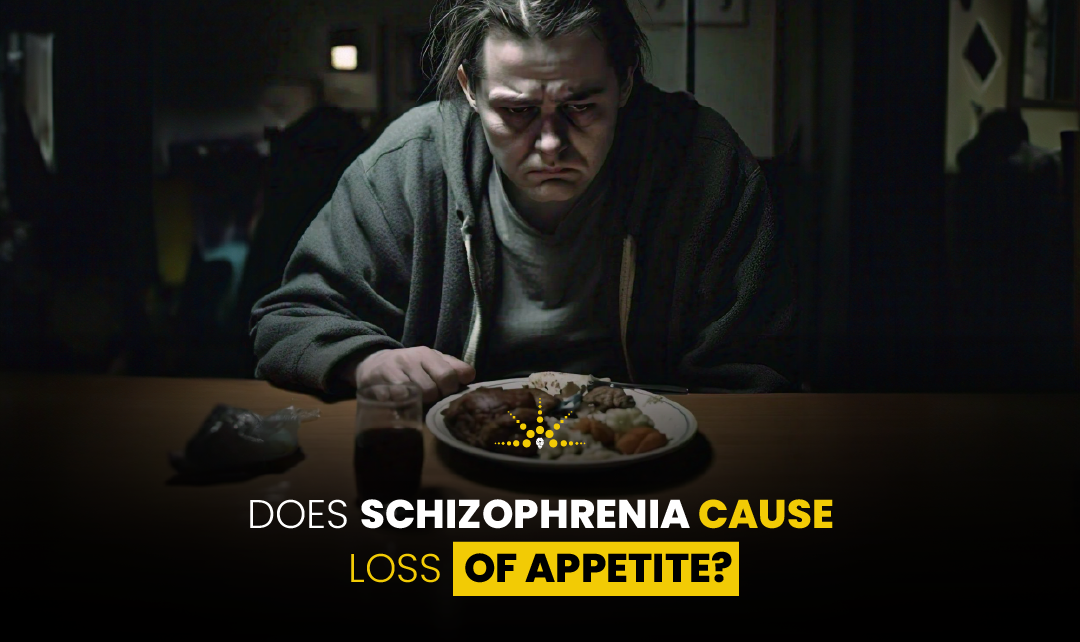Schizophrenia is often seen through the lens of its intense symptoms. These can be hallucinations, delusions, and confused thoughts. But there’s more to this mental issue.
We can’t ignore its effect on hunger and eating preferences. Even minor symptoms can greatly impact one’s health. This makes their management vital.
We will explore how schizophrenia might lead to loss of appetite. We’ll dig into its reasons and the role of nourishing food in managing the situation.
When schizophrenia impacts either you or a person close to you, don’t forget—help and hope are nearby. Contact SafeStar Psychiatric today to prepare a care plan that is thoughtful, and customized for your needs.
Understanding Schizophrenia
Before we link schizophrenia to appetite, we should understand the disorder. Schizophrenia is a serious, ongoing brain condition.
It affects nearly 20 million people across the world. One symptom is psychosis. This means patients might hear unreal voices, have unsystematic thoughts, or believe in delusions.
Understanding Positive, Negative, and Cognitive Symptoms in Mental Health
Positive symptoms are things like hallucinations, delusions, and thought disorders. They alter a person’s regular experience; that’s why we call them “positive.” For example, one might hear nonexistent voices or believe they have unique skills.
Negative symptoms refer to a decrease or loss of normal functions. They involve things like a lack of motivation, social depression, and an inability to feel joy. These symptoms are tough since they seriously alter daily life abilities.
Cognitive symptoms mostly influence mental health aspects like memory, attention, and executive function. If you have these symptoms, you might struggle to plan, concentrate, or finish tasks.
One symptom that may not be obvious is loss of appetite. This can worsen other symptoms and affect overall health, usually due to inadequate nutrition.
The Effect of Schizophrenia on Appetite
People with schizophrenia can lose their appetite for a number of reasons, including side effects from medications, negative and cognitive symptoms, and emotional stress.
Let’s look at these things and figure out how they affect changes in eating habits.
Side Effects of Medicine
Antipsychotic drugs are the main way that schizophrenia is treated. It’s used to treat psychotic symptoms, but it can change your hunger in a few different ways:
- Feeling Sick and Having Stomach Problems
Most antipsychotics make people sick or give them other stomach problems. Which makes you want to eat less in the end.
- Changes in How You Taste Things
Some drugs change the way food tastes, making it less appealing or even gross. which finally makes you not enjoy eating as much and makes you lose your appetite.
- Worries About Gaining Weight
Some antipsychotics can also make you gain weight, which can make you want to eat again. People who are trying to lose weight may skip meals, which is bad for their diet.
Negative Effects and Losing Your Appetite
People with schizophrenia often lose their appetite because they are bored or unmotivated, which are seen as negative signs.
- Apathy and anhedonia: People with schizophrenia may feel apathetic and not interested in doing things, like eating. Anhedonia, the inability to feel happiness, can make people less interested in food.
- Withdrawal from social situations: Being alone is another typical sign. People who avoid social activities, like eating meals with others, may find it easier to lose their appetite and eat less often.
- Disrupted Routine: Schizophrenia also changes the daily routine, which makes it hard to keep up with normal eating habits. People often eat at odd times or don’t eat at all, which leads to bad nutrition.
Cognitive Problems and Bad Eating Habits
Dealing with schizophrenia can create difficulties with tasks like meal planning and preparation due to cognitive symptoms. This often results in inconsistent eating patterns.
- Trouble Planning and Making Meals: It can be tough to plan and cook meals. Cognitive issues can lead to struggles with things such as meal planning and cooking. Sometimes, remembering to eat, purchase food, or stick to a recipe can be a challenge.
- Can’t Recognize Eating Times: Having issues remembering can lead to skipped meals. Sometimes, people may forget to eat or don’t realize they’re hungry, and they might not eat for extended periods.
Mental Anxiety and Loss of Appetite
Worries and lack of hunger often go hand in hand. Two common culprits? The mental health concerns anxiety and sadness.
- Anxiety: Can often lead to physical responses, like not feeling hungry anymore. Schizophrenia symptoms can compound this, increasing the loss of appetite.
- Depression: On top of this, people suffering from schizophrenia often battle depression. A grim offshoot of this can be their dwindling interest in food. More-over, it’s common for those in the grips of depression to neglect meals or eat in scanty quantities with the presence of such symptoms.
Healthy Eating’s Impact on Schizophrenic
While wholesome nutrition is essential for all, it’s vital for those with schizophrenia. Benefit from proper food to manage your symptoms and boost your well-being. Here’s why nutrition matters and its benefits.
Help with Nutrition for Schizophrenia
Mental and brain health needs a good diet. A right diet can be a beneficial for people with schizophrenia. It can control their symptoms and make daily life better.
- Omega-3 Fatty Acids: They’re in fish, flaxseed, and walnuts. This can lessen inflammation and lend a hand to people with schizophrenia. Loads of antioxidants are in fruits and vegetables. They guard brain cells and help keep thoughts sharp.
- B vitamins: Vitamins like B12 and folate boost brain health. Low levels can push the risk of schizophrenia and mental health troubles up.
Addressing Malnutrition and Its Consequences
Combating undernutrition and its effects A bad diet or dehydration can make schizophrenia symptoms worse and cause more health problems.
- Nutrition Advice
Working with a nutritionist or dietitian can help those with schizophrenia create a balanced diet. This advice also provides ways to beat the struggle of losing appetite.
- Meal Planning and Preparation
Assistance with meal planning and cooking is important for maintaining a healthy diet. Here, the family members, carers, or community programs’ support can be a game changer.
Upgrade Support and Encourage Nutritious Food Habits
Support systems play a key part in handling nutrition in schizophrenia.
- Family Role: Families can help one another by cooking meals together, sticking to regular meal times, and offering emotional comfort.
- Community Initiatives: Community initiatives can also help manage balanced meals, offering nutrition knowledge, and supporting a healthy diet plan. Such initiatives provide social connections, which ultimately lessen feelings of solitude.
More Methods for Managing Appetite Decrease
Besides acknowledging symptoms and boosting nutrition, other ways aid in taming appetite loss:
- Ongoing Physical Activity Engaging in activities like exercise can be essential not only for advancing overall wellness but also for maintaining a healthy weight in schizophrenia cases and lifting their spirits.
- Conscious Eating Habits Conscious eating habits, such as focusing on eating without distractions and noticing hunger signals, promote healthier connections with food. It can also help manage anxiety.
- Solving Food Fears Food-related anxiety is another significant problem for many, especially in low-income schizophrenia sufferers. Being able to afford healthy food or nutrition is crucial for managing appetite loss and maintaining strong overall health.
Wrapping Up
Schizophrenia plays a role in more than just brain function. It affects the whole body, including hunger. The lower hunger levels in folks with schizophrenia are a complex issue.
It’s highlighted by the side effects of drugs, negative signs, thinking troubles, and emotional stress. Tackling this problem needs a full understanding of nutritional help, support networks, and ways to foster good food habits.
By focusing on these elements, people with schizophrenia can use what they eat to bounce back, handle their symptoms better, and raise their overall life quality.
Knowing the link between schizophrenia and loss of hunger matters a lot in providing complete care and support for those dealing with this tough disorder.
FAQs
What are the common symptoms of schizophrenia that affect appetite?
Eating habits can be disturbed by several schizophrenia symptoms. Mainly:
- Medication Effects: Nausea, changes in taste, and concern about gaining weight due to antipsychotic drugs.
- Negative Symptoms: Apathy and a disinterest in social situations can lessen the desire to eat.
- Cognitive Issues: Troubles with planning and memory plus inconsistent eating patterns can cause poor food intake.
- Mental Stress: Anxiety and depression may decrease the desire for food.
What are the cognitive symptoms of schizophrenia?
This disease hits memory, focus, and problem-solving hard. People who have it often battle to plan things, straighten out their thinking, or stay focused.
Can schizophrenia be cured?
No, you can’t cure schizophrenia, but you can handle it pretty well. A lot of people with the disorder live a good life by sticking to a treatment program with medication, therapy, and some life changes.
How does exercise help people with schizophrenia?
Working out boosts overall health, keeps weight in check, lifts spirits, and can ease both anxiety and depression, which often come with schizophrenia.
Can stress worsen schizophrenia symptoms?
It can make schizophrenia pretty bad. So, it’s crucial to keep stress in check with therapy, a healthy routine, and help from your support network to manage this illness.







No comment